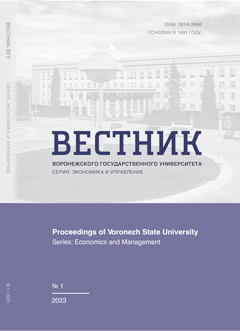ЦИФРОВАЯ ЭКОНОМИКА КАК ОДНА ИЗ МОДЕЛЕЙ РАЗВИТИЯ ПОСТИНДУСТРИАЛЬНОГО ОБЩЕСТВА
Аннотация
Статья посвящена теоретическим подходам, отражающим суть концепции «цифровой экономики» как одной из моделей постиндустриального развития общества. Неотъемлемым элементом исследования является и понятие «технологий», являющихся важнейшим продуктом цифровой экономики. Такие технологии основаны на представлении информации в битах, распространяемых посредством компьютера и сети Интернет и имеющие свою собственную экосистему.
Литература
2. The Digital Economy In 5 Minutes. – URL.
3. Tsyganov S. Digital Economy : a new paradigm of global information society / S. Tsyganov, V. Apalkova. – Economic review, volume 45, 3/2016. – 16 p.
4. Zelazny R. Information Society and Knowledge Economy – Essence and Key Relationships / R. Zelazny. – URL.
5. Bell D. The Coming of Post-Industrial Society : A Venture in Social Forecasting / D. Bell. – Basic Books, New York, 1973. – P. 36.
6. Rose M. A. The Post-Modern and the Post-Industrial : A Critical Analysis / M. A. Rose. – Cambridge University Press, Cambridge, 1991. – P. 170.
7. Soper D. S. An Empirical Examination of the Impact of ICT Investments on Future Levels of Institutionalized Democracy and Foreign Direct Investment in Emerging Societies / D. S. Soper, H. Demirkan, M. Goul, R. S. Louis // Journal of the Association for Information Systems. – 2012. – Vol. 13, No. 3. – P. 119.
8. Leipold H. Wirtschafts- und Gesellschaftssysteme im Vergleich / H. Leipold. – Gustav Fischer Verlag, Stuttgart, 1988. – P. 120.
9. Zafirovski M. Economic Sociology Reformulated : The Interface Between Economics and Sociology / M. Zafirovski, B. B. Levine // American Journal of Economics & Sociology. – 1997. – Vol. 56, No. 3. – P. 266.
10. Schumpeter J. A. Creative Destruction. From Capitalism, Socialism and Democracy. – New York : Harper, 1975 [orig. pub. 1942].
11. Stigler G. The Economics of Information / G. Stigler. – The J. of Political Econ., 1961, Vol. 69. No 3.
12. Arrow K. J. Economic Welfare and the Allocation of Resources for Invention // Collected Papers of Kenneth J. Arrow. – Vol. 5. Cambridge : Harvard University Press.
13. Langlois R. N. (1985), From the knowledge of economics to the economics of knowledge : Fritz Machlup on methodology and on the knowledge society, Research in the History of Economic Thought and Methodology, 3, 35–225.
14. Romer P. M. Increasing Returns and Long-Run Growth, Journal of Political Economy 94 (October 1986): 1002–1037.
15. Drucker P. (1993), Post Capitalist Society, Harper Row, New York, NY. – URL.
16. Lundvall and Johnson. 1994. – URL.
17. Stiglitz J. E. Capital Market Liberalization, Economic Growth, and Instability. – World Development Volume 28, Issue 6, June 2000. – P. 1075–1086.
18. Cowan R., David P.A., Foray D. 2000. The explicit economics of knowledge codification and tacitness. Ind. Corp. Change 9:211–53.
19. Machlup F. (1962), The Production and Distribution of Knowledge in the United States, Princeton : Princeton University Press.
20. Porat M. The Information Economy / M. Porat. – Washington, D.C. : U.S. Government Printing Offi ce, 1977.
21. Stanback T. M. 1979. Understanding the Service Economy : Employment, Productivity, Location. Baltimore, MD : Johns Hopkins Univ.Press.
22. Walter W. Powell The Knowledge Economy / W. Powell, K. Snellman. – Annu. Rev. Sociol. 2004. 30:199. – 220 p.
23. Brynjolfsson E. Beyond Computation : Information Technology, Organizational Transformation and Business Performance / E. Brynjolfsson, L. M. Hitt // Journal of Economic Perspectives. – Volume 14, Number 4. – Fall 2000. – P. 23–48.
24. Gordon R. Does the «New Economy» Measure up to the Great Inventions of the Past?. – URL.
25. Kochan T. A. The Changing Nature of Work and Its Implications for Occupational Analysis / T. A. Kochan, S. R. Barley. – Washington, DC : Natl. Res. Counc, 1999.
26. Nonaka I., Takeuchi H. – New York, 1995. – URL.
27. Prusak L. 1997. Knowledge in Organizations. Boston, MA : Butterworth-Heinemann.
28. Макаров В. Л. Микроэкономика знаний / В. Л. Макаров, Г. Б. Клейнер. – М. : Экономика, 2007. – 203 с.
29. Cowan R. The explicit economics of knowledge codification and tacitness / R. Cowan, P. A. David, D. Foray. – Ind. Corp. Change 9:211. – 53 p.
30. Кудина М. В. Социально-гуманитарное образование в экономике знаний / М. В. Кудина, М. А. Сухарева // Государственное управление. Электронный вестник. – М. : МГУ, 2017. – No 65. – C. 5–8.
31. Negroponte N. Being Digital / N. Negroponte. – New York: Alfred A. Knopf, Inc.; Vintage Books, 1996.
32. Ordanini A. Measuring the digital divide : a framework for the analysis of cross-country differences.– URL.
33. Brynjolfsson E. Understanding the digital economy : data, tools, and research / E. Brynjolfsson, B. Kahin. – Cambridge, Mass. : MIT Press, 2000.
34. Carlsson B. The Digital Economy : what is new and what is not? – URL.
35. Sharma S. Internet Economics. – URL.
36. Skilton M. Building the Digital Enterprise A Guide to Constructing Monetization Models Using Digital Technologies / M. Skilton. – Springer, 2016.
37. Козырев А. Н. Цифровая экономика и цифровизация в исторической ретроспективе / А. Н. Козырев.
38. О Стратегии развития информационного общества в Российской Федерации на 2017–2030 годы : указ Президента Российской Федерации от 9 мая 2017 г. No 203. – URL.
39. Dahlman C., Mealy S., Wermelinger M. Harnessing the Digital Economy for Developing Countries, OECD, Paris 2016. – URL.
40. Rouse M. Digital Economy. – Techtarget, Newton, MA, 2016. – URL.
41. Pullen D. L. Back to Basics : Electronic Collabora-tion in the Education Sector. – URL.
42. Goldfarb A., Tucker C. Digital Economics. – URL.























